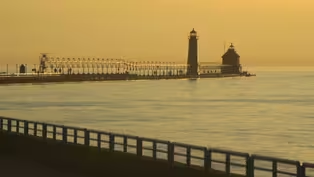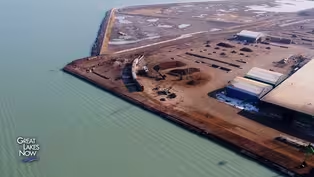
Battling Food Waste for People and the Planet
Clip: Season 3 Episode 6 | 8m 6sVideo has Closed Captions
Learn how keeping food waste out of landfills can help to fight climate change.
In the U.S. and around the world, food waste is a big problem, and when food waste ends up in landfills, it creates methane - a greenhouse gas that contributes to climate change. Join us in Cleveland, Ohio, where the Rust Belt Riders are composting food waste to help the environment and kickstart the city’s circular economy.
Problems playing video? | Closed Captioning Feedback
Problems playing video? | Closed Captioning Feedback
Great Lakes Now is a local public television program presented by Detroit PBS

Battling Food Waste for People and the Planet
Clip: Season 3 Episode 6 | 8m 6sVideo has Closed Captions
In the U.S. and around the world, food waste is a big problem, and when food waste ends up in landfills, it creates methane - a greenhouse gas that contributes to climate change. Join us in Cleveland, Ohio, where the Rust Belt Riders are composting food waste to help the environment and kickstart the city’s circular economy.
Problems playing video? | Closed Captioning Feedback
How to Watch Great Lakes Now
Great Lakes Now is available to stream on pbs.org and the free PBS App, available on iPhone, Apple TV, Android TV, Android smartphones, Amazon Fire TV, Amazon Fire Tablet, Roku, Samsung Smart TV, and Vizio.
Providing Support for PBS.org
Learn Moreabout PBS online sponsorshipIn both the US and Canada, food waste is a huge problem squandering resources and producing greenhouse gases.
But one group in Cleveland is aiming to divert food for the landfills feed hungry people and inspire Clevelanders and the rest of us to reconsider what we put in the trash.
(air whooshing) - [Narrator] When you drive around Cleveland, Ohio, you see remnants of the city's gritty industrial past as well as vibrant art, bustling restaurants and lush urban gardens.
And if you know where to look you'll also spy Rust Belt Riders' trucks and food waste drop-off bins.
The Rust Belt Riders provide composting services to residents, businesses and organizations.
Co-founder Daniel Brown and his team divert an impressive amount of food waste from landfills.
- Since 2014, we have diverted 13 million pounds of food waste from going to landfills.
And just last year we picked up 5.5 million pounds of food scraps.
- [Narrator] While that's an impressive stat Brown says it's just the tip of the iceberg.
- A sobering but also alarming statistic is that we're estimating that 5.5 million pounds of food waste that we're collecting is about 1% of all of the food waste in our region.
And so there's a lot more food that needs to be diverted a lot more infrastructure that needs to be created.
- [Narrator] Food waste isn't just a Great Lakes problem.
According to Brown food waste is one of the most overlooked problems in the US.
- Roughly 40% of all the contents in landfills could otherwise be composted and much of that is food.
This is at the exact same time, one in northeast Ohio, one in five children are food insecure.
And so the amount of food that we send to landfills from a from a capital standpoint comes out to around $218 billion dollars annually on the growing, processing, transportation and disposal of food that never gets eaten, that's like 1.4% of our GDP nationally.
And all that material, when it goes to landfill, it emits methane gas which is a very potent greenhouse gas that accelerates the climate crisis.
And so one of the biggest things that we can do, to create a more equitable, healthy community that is climate resilient is to ensure that food not ever go to landfills.
- [Narrator] Rust belt Riders began humbly in 2011, while Brown and his co-founder, worked at a local farm to table restaurant.
- We saw just how much food was being thrown away in an environment that was arguably the most thoughtful procurer of local foods and a supporter of our local food system.
And so to us it was just this unconscionable thing.
And so if we thought, "How could we like close that loop?"
- [Narrator] Their initial approach was relatively simple.
- If we could convince restaurants to provide us with their food waste, we could get that to community gardens and help them turn it into compost.
And so we cobbled together a couple thousand dollars.
We bought a mountain bike we welded a trailer to the back of said mountain bike, and sort of the rest is history.
We started riding around picking up food scraps like 300 pounds at a time and taking those to community gardens where we would turn it into compost.
- [Narrator] Fast forward to today, the once scrappy startup is now a full fledged worker-owned cooperative.
- Today we've got about 30 or so people on our staff.
We've got routes that we're running multiple times a day, six days a week.
We have a bevy of services that we offer.
So we offer commercial services to businesses, organizations, and institutions.
We work with around 300 different locations across Northeast Ohio to provide them with a clean, timely and community benefiting alternative to landfills.
- [Narrator] To close the sustainability loop, Brown and his team use the food scraps to create compost which is then used to create their line of Tilth Soil products.
- It isn't good enough to simply just divert food from going to landfills.
You need to actually create products from it that can be recirculated and reintroduced into our food system.
And so Tilth Soil's the manifestation of that idea.
And so we make potting mixes, we make raised bed fill mixes we make mixes for house plants and those are like bagged around me, as you can see.
- Here at the historic West side market.
Rust Belt Riders is working on a pilot program for the Mayor's Office of Sustainability.
That includes not only composting, but also food rescue.
Kathy Len from Circular Cleveland is the city's lead on the project.
- It's important to begin composting and food rescuing here at the West side market to begin our transition from a linear economy to a more circular economy where we want to increase the diversion of organic waste from the landfill and also provide more food to our residents, if they're in need.
- [Narrator] Chelsea Sherin, directs the food rescue component of the program on behalf of Hunger Network, an emergency food provider in Cleveland.
- Food rescue is really taking that surplus, usable and edible product.
It may not be perfect in every way, shape or form but taking that product, keeping it out of the landfill, and then donating it to people who need it.
- [Narrator] Vendors at the West side market use a food rescue dispatch line to coordinate their donations.
- So whenever a vendor has product, they're like, "Hey, I got two boxes."
They'll shoot a text or their call and say, "This is so and so, from the West side market at this booth I have three boxes of produce to donate," and from there my team will coordinate a pickup.
Our program is direct transfer meaning we don't bank or warehouse or store any product.
We're trying to get it immediately from the donor to the recipient where it's often on the plates of those who need it within an hour.
- [Narrator] Robert Kurtz, Sales Coordinator for Rust Belt Riders works with vendors to compost any remaining food.
- If it can't be rescued and it can't go to somebody first then we try to make sure that it doesn't end up in the landfill by composting.
So we're asking them to take all of their food scraps that first, can't go to somebody in need and can't be eaten.
Things like the tops of pineapples, banana peels maybe berries that have gone bad, things like that.
We're asking them simply to just put them in a composting bin, which we come around and pick up and divert from the landfills, and turn in the soil.
- [Narrator] The initial results of the program are promising.
- So since we started this pilot in January we've been able to divert 13,000 pounds of material.
We project that by the end of the pilot.
It's a six month pilot, we should have another 20,000 pounds captured.
- [Narrator] The City's collaboration with Rust Belt Riders doesn't stop there.
The team is helping the City outline a possible city-wide composting program.
- We're hoping that residents would be very excited about having access to composting provided by the City.
The biggest challenge that we face is we're asking people and businesses to change their behavior, and that's always very difficult.
We're all very set in our ways and our habits - [Narrator] But revamping Cleveland's approach to food waste has the potential to help the environment and also the local economy.
- A lot of what we're trying to do is demonstrate like there's a healthy economy to be had.
There are good paying jobs to be had.
This isn't just a cute thing that like is done in the Netherlands, right?
It can happen here and we cannot continue to be on this treadmill off a cliff, right?
And so we need to find a way to sort of reimagine our relationships with resources, with communities and reinvest and rethink how we design things, and so we're doing that humbly with food.
Video has Closed Captions
Clip: S3 Ep6 | 8m 13s | The Catch is Great Lakes Now’s one stop shop for bite-sized news about the lakes you love. (8m 13s)
A Community Fights For A Cleaner Future
Video has Closed Captions
Clip: S3 Ep6 | 8m 23s | They live in one of the most polluted areas of the Great Lakes and they’re fighting back! (8m 23s)
Providing Support for PBS.org
Learn Moreabout PBS online sponsorship
- Science and Nature

Explore scientific discoveries on television's most acclaimed science documentary series.

- Science and Nature

Capturing the splendor of the natural world, from the African plains to the Antarctic ice.












Support for PBS provided by:
Great Lakes Now is a local public television program presented by Detroit PBS

